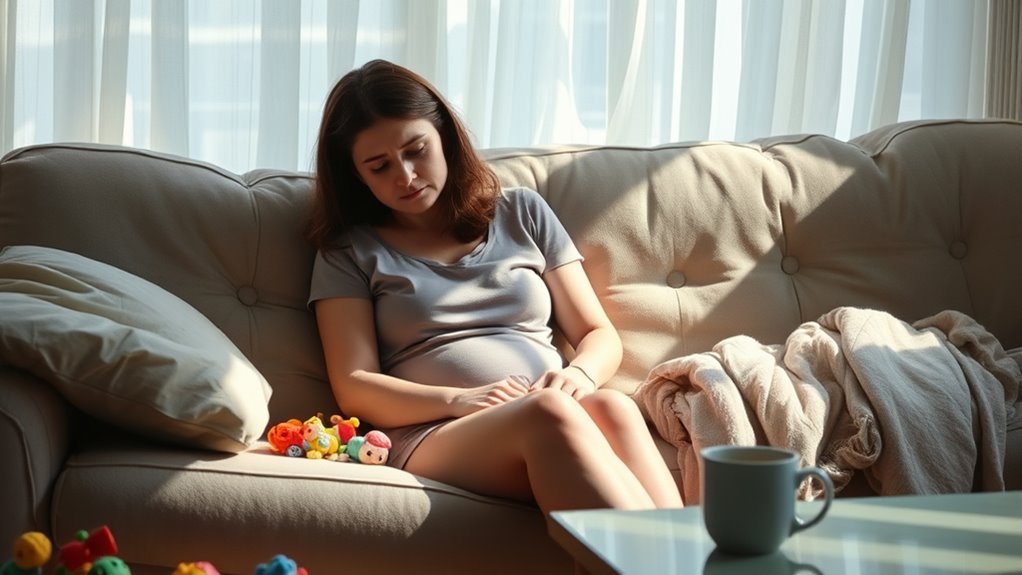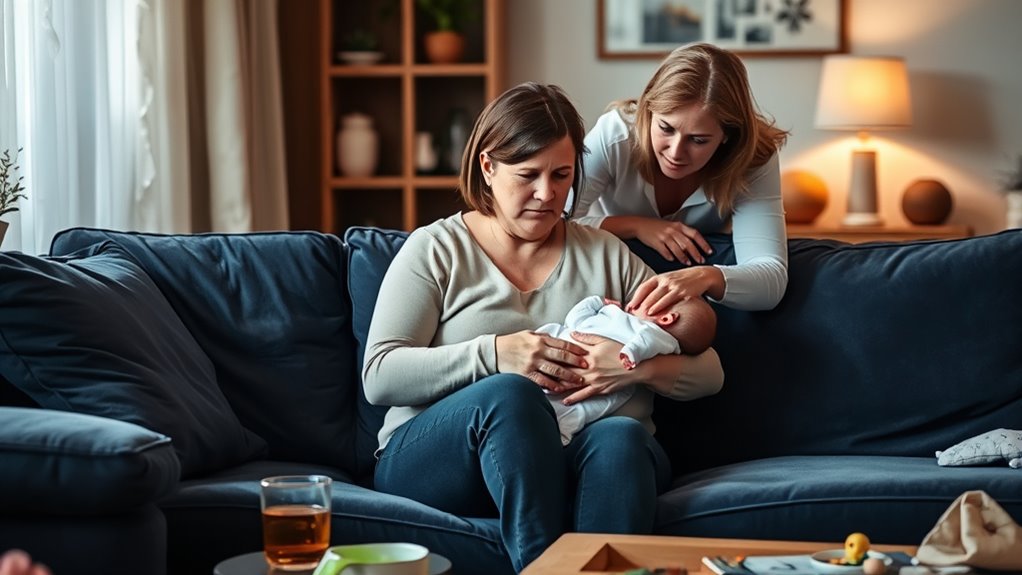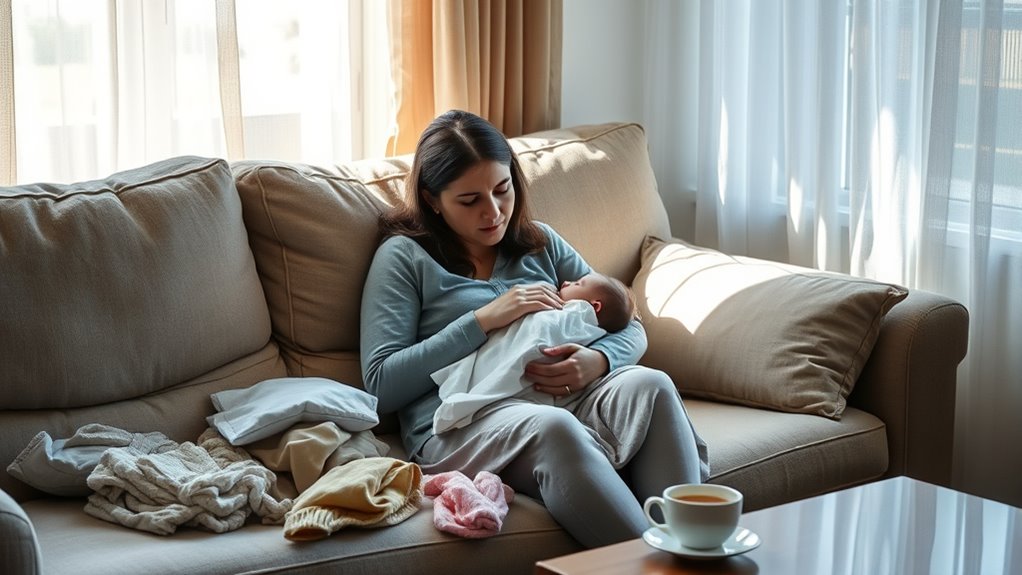To spot postpartum depression, look for persistent sadness, mood swings, and loss of interest in activities you once enjoyed. You might feel detached from your baby or struggle with anxiety about parenting. Watch for physical signs like fatigue and changes in sleep or appetite. If you’re finding it hard to care for your baby or think about self-harm, it’s essential to seek help. Understanding these signs can lead you to more effective support options.
Key Takeaways
- Look for persistent feelings of sadness, guilt, or irritability lasting more than two weeks after childbirth.
- Monitor for emotional detachment from the baby, leading to difficulties in bonding and attachment.
- Be aware of significant mood swings, crying spells, and a loss of interest in activities once enjoyed.
- Recognize changes in sleep patterns, appetite, and physical fatigue that may indicate emotional distress.
- Seek help if experiencing overwhelming anxiety or thoughts of self-harm, as these require immediate professional support.
Common Signs of Postpartum Depression

Postpartum depression (PPD) affects about 1 in 7 new parents, and recognizing its common signs is essential for getting the right help.
You might notice persistent feelings of sadness or guilt that just won’t go away. Mood swings, irritability, and crying spells are also emotional symptoms to watch for. Additionally, some parents may experience temporary loss of interest in activities they once enjoyed, which can further exacerbate feelings of isolation. Studies indicate that children of unfaithful parents may also face emotional challenges, highlighting the importance of addressing parental mental health.
A loss of interest in activities you once loved can signal PPD, along with difficulty concentrating or making decisions. Excessive worry about your parenting skills can feel overwhelming, even without a clear reason.
Changes in your sleep patterns—like insomnia or sleeping far too much—along with alterations in your eating habits, can further indicate postpartum depression.
Being aware of these signs can guide you toward seeking the support you need. Additionally, it is important to recognize that emotional manipulation can exacerbate feelings of inadequacy during this challenging time.
Emotional and Mental Symptoms

While adjusting to life with a new baby can be overwhelming, emotional and mental symptoms of postpartum depression (PPD) can complicate this change even further.
You might experience emotional symptoms like persistent sadness, excessive crying, and feelings of guilt that linger beyond two weeks. Mental symptoms can include difficulty concentrating, indecisiveness, and intrusive thoughts about your parenting abilities. Individuals experiencing PPD may also struggle with emotional dysregulation, which can amplify feelings of inadequacy. Recognizing patterns of emotional coldness can also be beneficial if these feelings persist.
You may feel emotionally detached from your baby, leading to bonding difficulties and isolation. Persistent anxiety and restlessness can also plague you, with overwhelming fears about both your baby’s well-being and your worth as a parent. Additionally, it is important to recognize that early detection of postpartum depression can improve recovery outcomes and overall mental health.
If these emotional and mental symptoms worsen or interfere with your daily tasks, seeking professional help is essential for your well-being.
Physical and Behavioral Changes

As you navigate the challenges of motherhood, you might notice several physical and behavioral changes that can signal postpartum depression (PPD). These changes can impact your ability to care for yourself and your baby. Recognizing these signs is crucial, as you are not alone on this journey and there are trusted companions who can help guide you. Research indicates that emotional well-being can be enhanced by pet therapy, which might provide comfort during this challenging time. Additionally, seeking support from mental health professionals can be invaluable in managing your symptoms.
| Physical Changes | Behavioral Changes | Emotional Signs |
|---|---|---|
| Fatigue | Withdrawal from social interactions | Persistent sadness |
| Sleep disturbances | Neglecting personal care | Mood swings |
| Changes in appetite | Treating caregiving as a duty | Frequent crying spells |
| Physical discomfort | Difficulty bonding with baby | Feelings of guilt |
| Inability to concentrate |
If you experience these changes for more than two weeks, they may indicate PPD. Recognizing these signs is the first step toward seeking support.
When to Seek Professional Help

Recognizing the signs of postpartum depression is vital, especially when they linger beyond two weeks. If you or a loved one is experiencing any of the following symptoms, it’s time to seek professional help:
- Persistent sadness or anxiety that interferes with daily life.
- Difficulty caring for your baby or completing everyday tasks.
- Thoughts of self-harm or harming your baby, which require immediate intervention.
Consulting a healthcare provider can provide the support needed to address these symptoms and improve your mental health. Additionally, building a support network can be crucial for navigating the emotional challenges associated with postpartum depression.
Remember, postpartum depression can affect new fathers too, so be aware of any changes in their mood or behavior.
Don’t hesitate to reach out to your family or seek medical assistance—your well-being matters.
Supporting Others Experiencing PPD

Supporting someone experiencing postpartum depression (PPD) can feel overwhelming, but your presence and understanding can make a significant difference.
Pay attention to their feelings; frequent crying, difficulty bonding with the baby, or treating caregiving as a chore are signs they may need help.
Also, watch for withdrawal from friends and family, as isolation can worsen their mental health.
Listen for negative speech and expressions of hopelessness; these indicate the need for support.
Encourage them to talk about their feelings and reassure them that it’s okay to seek professional help.
Offer practical support, like helping with chores or simply being there to listen.
Your care can help them feel less alone during this challenging time.
Frequently Asked Questions
How Do I Know if I Have Postpartum Depression?
If you’re wondering whether you have postpartum depression, pay attention to how you’re feeling.
Are you experiencing persistent sadness or a loss of interest in activities you once enjoyed?
Do you find it hard to concentrate, or feel overwhelmed with guilt about parenting?
If these feelings last beyond a couple of weeks and impact your daily life, it’s essential to seek help.
When Does Postnatal Depression Start?
Postnatal depression can start at various times after childbirth, often emerging between one to three weeks post-delivery.
However, it’s important to know that symptoms mightn’t show up right away. Sometimes, they can appear months later, catching you off guard.
While many new parents experience the “baby blues,” postnatal depression can linger and disrupt your daily life.
Staying aware of your feelings is key to addressing any concerns promptly.
What Are the Warning Signs of Postpartum?
You might notice several warning signs of postpartum depression.
Persistent feelings of sadness or guilt that seem to worsen can signal deeper issues. If you find yourself losing interest in activities you once loved, struggling to concentrate, or worrying excessively about your parenting abilities, these could be red flags.
Additionally, changes in sleep and eating habits, along with strong emotions, mean it’s essential to seek help if these feelings last beyond two weeks.
What Are the Criteria for Postpartum Depression?
So, you think you might be just a little sad after having a baby?
Well, to be diagnosed with postpartum depression, you’re gonna need five or more symptoms, like persistent sadness, anxiety, and fatigue.
You can’t just feel tired because you’ve been up all night!
These symptoms must last at least two weeks and seriously interfere with your daily life.
It’s a bit more complicated than just needing a nap, don’t you think?
Conclusion
Recognizing postpartum depression is essential for both your well-being and the well-being of your loved ones. If you or someone you know is experiencing these signs, don’t hesitate to seek help. Remember, it’s okay to ask for support—after all, isn’t it better to face these challenges together than to struggle alone? By understanding and addressing PPD, you can pave the way for healing and connection, ensuring a healthier journey into parenthood.









